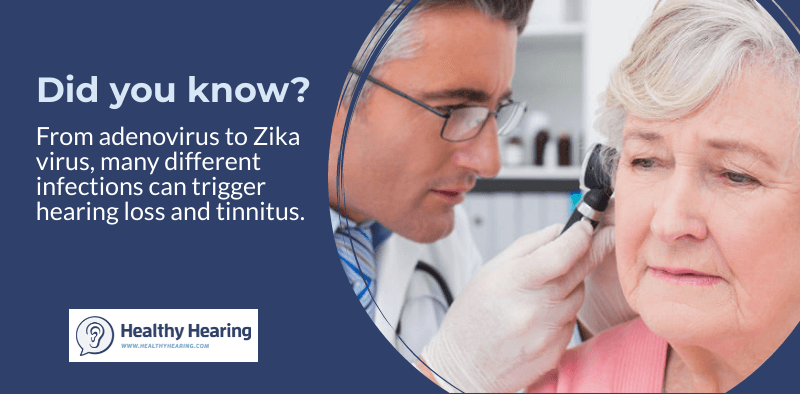|
www.HealthyHearing.com |
What infections are linked to hearing loss?From adenovirus to Zika virus, many infections can trigger hearing loss and ear ringing
Contributed by Joy Victory, managing editor, Healthy Hearing Numerous types of infections can inflame or damage the inner era, leading to hearing loss, tinnitus and balance problems. In some cases, the problems might pop while you're sick or soon after—for example, if you had COVID-19 or a recent bad cold—but in other cases, you may not even realize you had an infection, and sudden hearing problems are the first sign that's anything wrong. 
In rarer cases, problems can even occur decades after an infection, due to reactivation of a dormant virus. For example, shingles or varicella zoster, the virus that causes chickenpox, can reactivate and inflame the nerve that connects the inner ear to the brain. Named Ramsay Hunt syndrome, this painful condition made headlines in June 2022 after pop star Justin Bieber revealed he was experiencing it. How infection can affect the earsAny slight upset to the delicate inner ear can affect how we hear and our sense of balance, including viral and bacterial infections. These germs can directly infect the ear, such as with otitis externa (swimmer's ear), or they infect other parts of the body but lead to inflammation that also affects the ears. Symptoms will vary depending on the infection, and may include fever, earache, itchiness, swelling, stuffy, clogged or muffled hearing, ringing in the ears, and dizziness. Infection-based hearing problems usually only affect one ear, which causes unique problems with hearing. Typically, these problems are temporary, but not always. Here's a look at several different types of infections and how they can affect hearing. (Note: This is by no means a comprehensive list of all infections known to damage hearing, just the more well-known ones.) Respiratory illnesses including the common coldBy far the most common infection linked to hearing problems is the common cold. This is especially true in kids, who are at higher risk of middle ear infections (otitis media) after having a cold. Numerous viruses cause the common cold, including adenoviruses, coronaviruses, enteroviruses and rhinoviruses. The body's inflammatory response to the cold can cause fluid and mucus to build up behind the ear drum, leading to pain and muffled hearing. A secondary bacterial sinus infection can do the same. In most cases, hearing problems are temporary. COVID-19While not common, COVID-19 can indeed infect or inflame the ear, leading to hearing loss or tinnitus. It's also thought that in rare cases vaccination can trigger tinnitus, though the research is still emerging in this area. See our articles for more on these two possible complications: Childhood viral infectionsAlong with the common cold, several other childhood bacterial and viral infections can lead to hearing loss, tinnitus, and balance problems. They include meningitis, congenital cytomegalovirus (CMV), chickenpox, measles, and mumps. (Before routine vaccination was common, the mumps in particular were a major cause of childhood hearing loss.) While less common, many of these can also affect adults, too. If your child has been sick with any of these infections and is now complaining of ear pain, muffled hearing, ear ringing or dizziness, take them to the doctor for prompt treatment. Prolonged hearing problems in younger kids can cause learning and language delays. Insect-borne infectionsGerms carried by mosquitoes and ticks can sometimes cause hearing loss. In one study, nearly half of people being treated for Lyme disease at a Polish clinic reported new problems with hearing and ear ringing. Zika virus, transmitted by mosquitoes, can cause hearing loss, too. Infection and sudden hearing lossSome people develop sudden hearing loss in one ear after a known infection, or they may lose their hearing seemingly out of nowhere. If it's the latter, a viral infection may still be the culprit. Any sudden hearing loss should be evaluated and treated promptly. The sooner treatment is started, the more likely the hearing loss will not be permanent. LabyrinthitisLabyrinthitis is a general term used to describe widespread inflammation in the inner ear, where the body's hearing and balance organs are located. This can cause hearing loss and tinnitus along with disabling bouts of vertigo (intense dizziness). Often the cause is unknown, but reactivation of a dormant virus—especially varicella zoster (chickenpox)—can trigger what's known as labyrinthitis and Ramsay Hunt syndrome. This syndrome should be suspected if a person also has ear blisters and facial weakness. A similar condition, Bell's palsy, may also be due to an underlying viral infection and is known to cause sound sensitivity, known as hyperacusis. Immune system over-reaction to infectionWhen the body's immune system attacks healthy tissue, it's known as autoimmune disease. Sometimes infections can trigger this kind of response, over-reacting to the presence of germs. While most people recover normally, some people develop a lifelong an autoimmune disease, which can carry its own hearing loss complications. Drugs to treat infections can be 'ototoxic'In some cases, it's not the infection but the treatment that leads to hearing loss, tinnitus or dizziness. This is especially the case for a class of antibiotics known as aminoglycosides, such as gentamicin, used to treat severe bacterial infections. But even common painkillers to treat earaches can lead to hearing problems if taken incorrectly. When this happens, it's known as ototoxicity. Always report ear-based side effects to your doctor. Who can help?If you are sick and experiencing any hearing problems—such as hearing loss, ringing in the ears or sudden dizziness—you may be wondering what hearing specialist to see. Reach out to your general healthcare provider as a first step. In some cases, they may refer you to an ear-nose-throat (ENT) doctor for specialized care. If your hearing loss is ongoing or permanent, they may also refer you to a hearing specialist near you for help with hearing aids and other treatments. Joy Victory, managing editor, Healthy Hearing
|
Featured clinics near me
Hearing Health Solutions from Ohio ENT - Columbus
974 Bethel Rd Ste B
Columbus, OH 43214
Earzlink Hearing Care - Reynoldsburg
7668 Slate Ridge Blvd
Reynoldsburg, OH 43068


Find a clinic
Need a hearing test but not sure which clinic to choose?
Call 1-877-872-7165 for help setting up a hearing test appointment.


 Joy Victory has extensive experience editing consumer health information. Her training in particular has focused on how to best communicate evidence-based medical guidelines and clinical trial results to the public. She strives to make health content accurate, accessible and engaging to the public.
Joy Victory has extensive experience editing consumer health information. Her training in particular has focused on how to best communicate evidence-based medical guidelines and clinical trial results to the public. She strives to make health content accurate, accessible and engaging to the public.